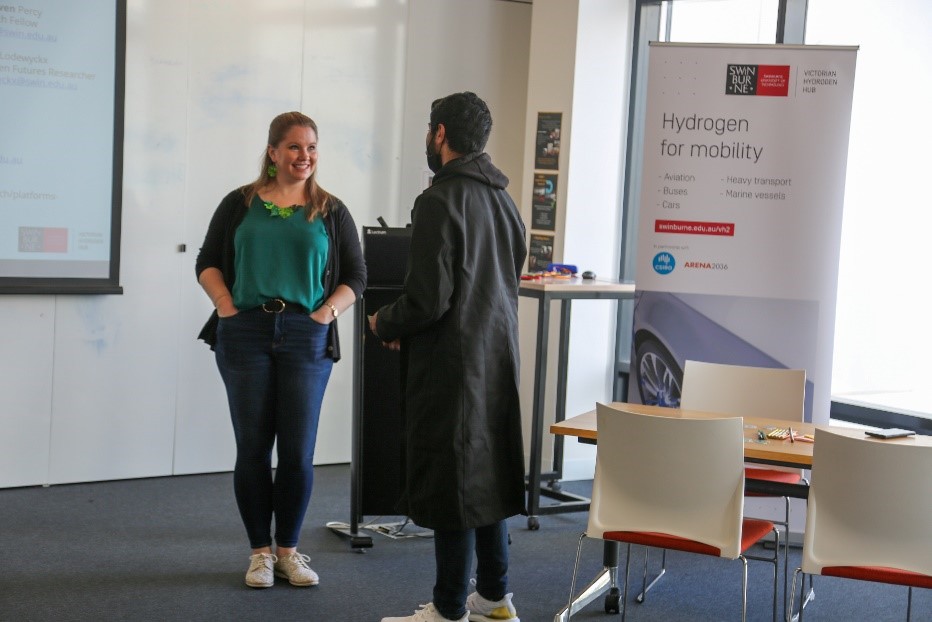Community acceptance of hydrogen up, but still long way to go

The Victorian Hydrogen Hub’s (VH2) Hydrogen 101 sessions boosted hydrogen acceptance and understanding among the Swinburne community.
In summary
- Hydrogen resources, education and media prevalence is having a positive impact, though there still obstacles in the way of achieving broader acceptance of hydrogen technology
- Climate change, safety and future careers were all common concerns for those surveyed about hydrogen technology
- Swinburne’s Victorian Hydrogen Hub (VH2) is boosting community knowledge and acceptance of hydrogen from industry and students
Hydrogen has the potential to create a more decarbonised world, reduce the impacts of climate change, and create new jobs in sectors such as engineering, gas, transport, electrical and mobility.
Recent work by Swinburne’s Victorian Hydrogen Hub (VH2) reveals that while progress is being made in community acceptance of a future hydrogen economy, further education is crucial for greater adoption.
Working with Design Factory Melbourne, VH2 ran Hydrogen 101 sessions for the community and collected data on their feelings towards hydrogen. The results told a story of concerns about climate change, future careers and accessible information, which are driving both positive attitudes and ongoing fears about the technology.
VH2 Social Licence Research Fellow, Dr Kim Beasy, says that understanding the way people feel about an energy source is just as important as developing the technology to utilise it.
“Over the next five years, hydrogen is likely to become a significant part of our lives, especially in some sectors such as transport,” says Dr Beasy.
“It's really important that we put the work in now to ensure the whole of our community is able to understand and benefit from what hydrogen has to offer, both environmentally as a decarbonisation strategy, and socially through the creation of new jobs.”

Participants of VH2’s Hydrogen 101 event shared their thoughts on hydrogen before and after the session.
Current hydrogen perspectives
Climate change is a driving factor behind people’s interest in hydrogen. “I wish we would figure out something soon so we can fight back climate change,” one participant said.
“There are more ways that hydrogen can be produced or that can be utilised. It’s a really excellent solution…that quite possibly can solve almost all environmental problems,” another commented.
A large number of participants at VH2’s Hydrogen 101 session were concerned with how hydrogen would affect them: their jobs, cars, homes and environment specifically.
Notes such as “I like the idea of driving a hydrogen car” and “I wonder if I will be a future employee under this technology” were common among Hydrogen 101 attendees.
However, technical topics such as hydrogen storage, distribution and technology were rarely mentioned in participants’ feedback, suggesting disinterest or a lack of accessible information.
There was also a discrepancy between worries of hydrogen safety. For younger generations, hydrogen safety was not so much of a concern whereas older generations often reflected on events such as the fatal Hindenburg disaster, where an airship caught fire because it was inflated with hydrogen.
“It was interesting to observe differences in people’s perceptions of hydrogen safety broadly correlating to age,” says Dr Beasy.
“This shouldn’t be unexpected because we all draw on our lived experiences to make sense of new situations; those that are older have more experiences to draw on! We know that safety is one of the main themes that the public mention when talking about hydrogen, but we also know that these concerns reduce with education.”
Activities such as VH2’s Hydrogen 101 are great for “dispelling any misconceptions about hydrogen,” says Dr Beasy.
“Research tells us that the more opportunity people have to learn and talk about hydrogen technologies, the more accepting of the technologies they become. At VH2, we find innovative ways of explaining how hydrogen is part of our broader energy system that go beyond scientific facts.”
-
Media Enquiries
Related articles
-

- Technology
- Science
- Sustainability
- Engineering
CSIRO and Swinburne invest in green steel and mineral processing to help industry get to net zero
CSIRO and Swinburne have established a new partnership to tackle global decarbonisation with innovative green steel and mineral processing research and development.
Thursday 01 February 2024 -

- Trades
- University
- Sustainability
Transforming Indigenous housing with future-forward solutions
Swinburne University of Technology has launched a new Indigenous Building Co-Fab initiative. The initiative will tackle housing affordability and sustainability by creating innovative pathways to upskilling communities themselves.
Tuesday 19 December 2023 -

- University
- Sustainability
French and Australian governments announce new partnership to tackle global energy crisis
Swinburne University of Technology will host a historic new partnership between France and Australia, FACET: the French-Australian Centre for Energy Transition.
Friday 08 December 2023 -

- Sustainability
- University
Green partnership to accelerate Swinburne’s research impact
Swinburne has partnered with Twynam’s Earth Fund to drive the commercialisation of decarbonisation research, accelerating the university’s innovation ecosystem.
Tuesday 21 November 2023 -

- Technology
- Science
- Sustainability
Swinburne and CSIRO launch state-of-the-art renewable hydrogen refuelling station
Swinburne University of Technology and CSIRO have launched a state-of-the-art clean hydrogen refuelling station, purpose-built for enabling hydrogen research.
Thursday 23 November 2023

